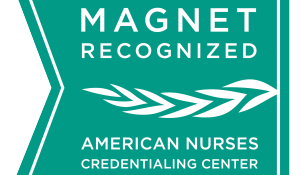Forces of Excellence: Magnet designation and the BSN or MSN educational requirement for nurse managers

Cheryl May, UB SON alumna and Children's National Medical Center's former Director of Professional Practice & Magnet Program, discusses the role of baccalaureate and master's degree preparation for registered nurses in hospitals seeking Magnet Recognition from the American Nurses Credentialing Center (ANCC).*
BY CHERYL MAY, MBA, BS '77 | DECEMBER 19, 2017
Shortages and waiting lists: The environment for registered nurses in the 1990s
In the 1990s, the United States experienced a severe nursing shortage. Although most hospitals were experiencing shortages of registered nurses, a few other hospitals had waiting lists of RNs who wanted to work there. After nurse leaders brought these concerns to the attention of the American Nurses Association (ANA) board of directors, ANA requested that their research arm, the American Academy of Nursing (AAN), investigate these reports. The AAN reported to ANA’s board of directors that the hospitals that were fully staffed had consistent similarities in professional nursing excellence and quality of care. The Magnet Recognition Program was developed around those shared characteristics.
Over the years, Magnet standards have evolved to reflect the rapidly changing health care system at large.
Health care professionals have been encouraged or mandated to increase their educational credentials to keep pace with an ever-challenging environment. Nursing is no exception. In 2011, a standard was added to the requirement of obtaining Magnet Recognition that stated 75 percent of all nurse managers must have a Bachelor of Science in Nursing (BSN) or a Master of Science in Nursing (MSN) degree. In 2013, the requirement was increased – it mandated that 100 percent of nurse managers must have a BSN or MSN to continue in the nurse manager position if the hospital has or is seeking Magnet Recognition.¹
Many very capable nurse managers with an associate degree perceived this change as unnecessary.
They believed they were doing very well managing nursing units without a bachelor’s degree. These associate degree-prepared RNs voiced barriers and challenges that could prohibit them from returning to school for their BSN or MSN. Work-life balance, confidence issues and economic issues were among their top concerns.²
The call for a better-educated nursing workforce has increased in intensity since the Institute of Medicine’s (IOM) report, “The Future of Nursing: Leading Change, Advancing Health.”³
The complexity of managing a nursing unit today involves numerous skill sets, which include:
- Understanding system improvement;
- Supporting nursing research and applying new knowledge to patient care;
- Evaluating unit data to assess evidence based outcomes;
- Creating an environment of teamwork and collaboration;
- Facilitating excellent intra-professional communication skills;
- Complex decision making;
- Understanding health policy (internally and externally); and
- Fiscally managing a small business unit.
The Oregon Consortium for Nursing Education and the New Mexico Nursing Education Model: An Innovative Approach to Academic Progress are two examples of successful programs that support associate-degreed nurses’ re-entry into the academic setting. Much can be learned from these programs. They address the many concerns of the nurses who are considering a return to the academic setting. Hospital systems, the chief nursing officer and nursing leadership provide the emotional, financial and scheduling support for successful completion of the BSN or MSN degree.
Historically, ANA called for a BSN requirement for all professional nurses by 1985.⁴ Today, many hospitals require a BSN for all new hire professional nursing positions.
New York and New Jersey lawmakers continue to propose regulations requiring the BSN as the minimum educational degree for entry into practice. The IOM and The Robert Wood Foundation (RWJF) are calling for 80 percent of all registered nurses to hold the BSN credential by 2020.⁵ The ANCC’s Magnet Recognition Program, IOM report, RWJF report and some state legislatures are increasing the momentum for increased education for the United States nursing workforce.
Many hospital administrators have realized the benefits of investing in a BSN or MSN nursing workforce.
Research findings suggest that the BSN or MSN degree has decreased turnover rates, which improves clinical outcomes – both resulting in a positive effect on the bottom line of the hospital.⁶ Many associate-degree prepared registered nurses have received the support that was required for them to return to school and obtain the BSN or MSN degree.
Early findings suggest that the educational standard in the Magnet Recognition Program has proven to be a win-win-win.
First and foremost, the patients and families win. The hospital system that invested in their nursing workforce win. And finally, the BSN or MSN prepared registered nurses win, as they are now often receiving increased salary benefits and new and challenging opportunities that were not been available to them before completing the BSN or MSN degree.
*The American Nurses Credentialing Center (ANCC) is an arm of the American Nurses Association (ANA).
¹2014 Magnet application manual. (2013). Silver Spring, MD: American Nurses Credentialing Center.
²Orsolini-Hain, L. M. (2012). Mixed messages: Hospital practices that serve as disincentives for associate degree-prepared nurses to return to school. Nursing Outlook, 60(2), 81-90. doi:10.1016/j.outlook.2011.05.007
³Duffy, M. T., Friesen, M., Speroni, K. G., Swengros, D., Shanks, L. A., Waiter, P. A., & Sheridan, M. J. (2014). BSN completion barriers, challenges, incentives, and strategies. Journal of Nursing Administration, 44(4), 232.
⁴Aiken, L. H. (2014). Baccalaureate nurses and hospital outcomes: More evidence [Editorial]. Medical Care, 52(10), 861-863.
⁶Lavizzo-Mourey, R. (2012). The nurse imperative. Journal of Nursing Education, 51(5), 243-244. doi:10.1111/j.1525-1446.2012.01012.x